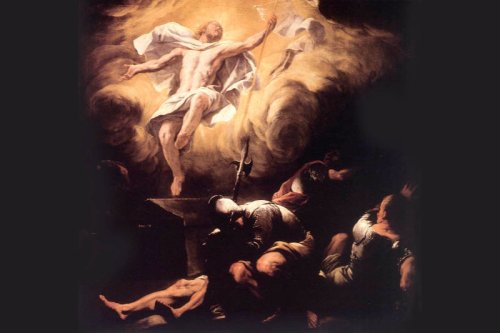
by Luca Giordano, 1665, Wikipedia, Public Domain
An interesting article on Christianity Today by Andrew Wilson, delves into a curious Biblical anomaly about Christ’s death and resurrection.
While there are ample, often vivid, descriptions of Christ’s death and suffering on the cross in the Old Testament, such as Isaiah 53 and Psalm 22, we don’t have similar direct descriptions of Christ’s resurrection.
Wilson, who pastors King’s Church in London, England, notes that Christ’s resurrection on the third day (1 Corinthians 15:3-5) is the very core of our Christian faith. As Paul explains a few verses later, “if Christ has not been raised, then our preaching is in vain and your faith is in vain” (1 Corinthians 15:4).
Though we don’t have a similar Isaiah 53 description of Christ’s third-day resurrection, Wilson says it’s hinted at multiple times in the Old Testament, all with profound significance.
First, Wilson notes that when God told Abraham to sacrifice his son, Isaac, the Lord provided a ram as a substitutionary sacrifice on the third day.
I had never noticed that connection before and actually read that passage in (Gen. 22:1–14), to confirm this and sure enough in verse 4, we read “On the third day Abraham lifted up his eyes and saw the place from afar.”
Then Wilson pointed to the story of Jonah, who “was in the belly of the fish three days and three nights” (Jonah 1:17) and how Queen Esther received enough courage and “on the third day Esther put on her royal robes and stood in the inner court of the king’s palace,” (Exodus 5:1), sparing the Jewish people living in Persian captivity from genocide.
Similarly, King Hezekiah who was dying from a boil is told by the Prophet Isaiah, “I have heard your prayer and seen your tears; I will heal you. On the third day from now you will go up to the temple of the Lord,” (2 Kings 20:5).
Citing other examples in addition to these, Wilson writes that this third-day theme is found prominently throughout the Old Testament.
“So when Hosea talks about Israel being raised up on the third day, he is not plucking a random number out of nowhere,” Wilson explains. “He is reflecting a well-established theme originating in the Bible’s first chapter. As Hosea says,
Come, let us return to the Lord.
He has torn us to pieces
but he will heal us;
he has injured us
but he will bind up our wounds.
After two days he will revive us;
on the third day he will restore us,
that we may live in his presence. (Hos. 6:1–2)
